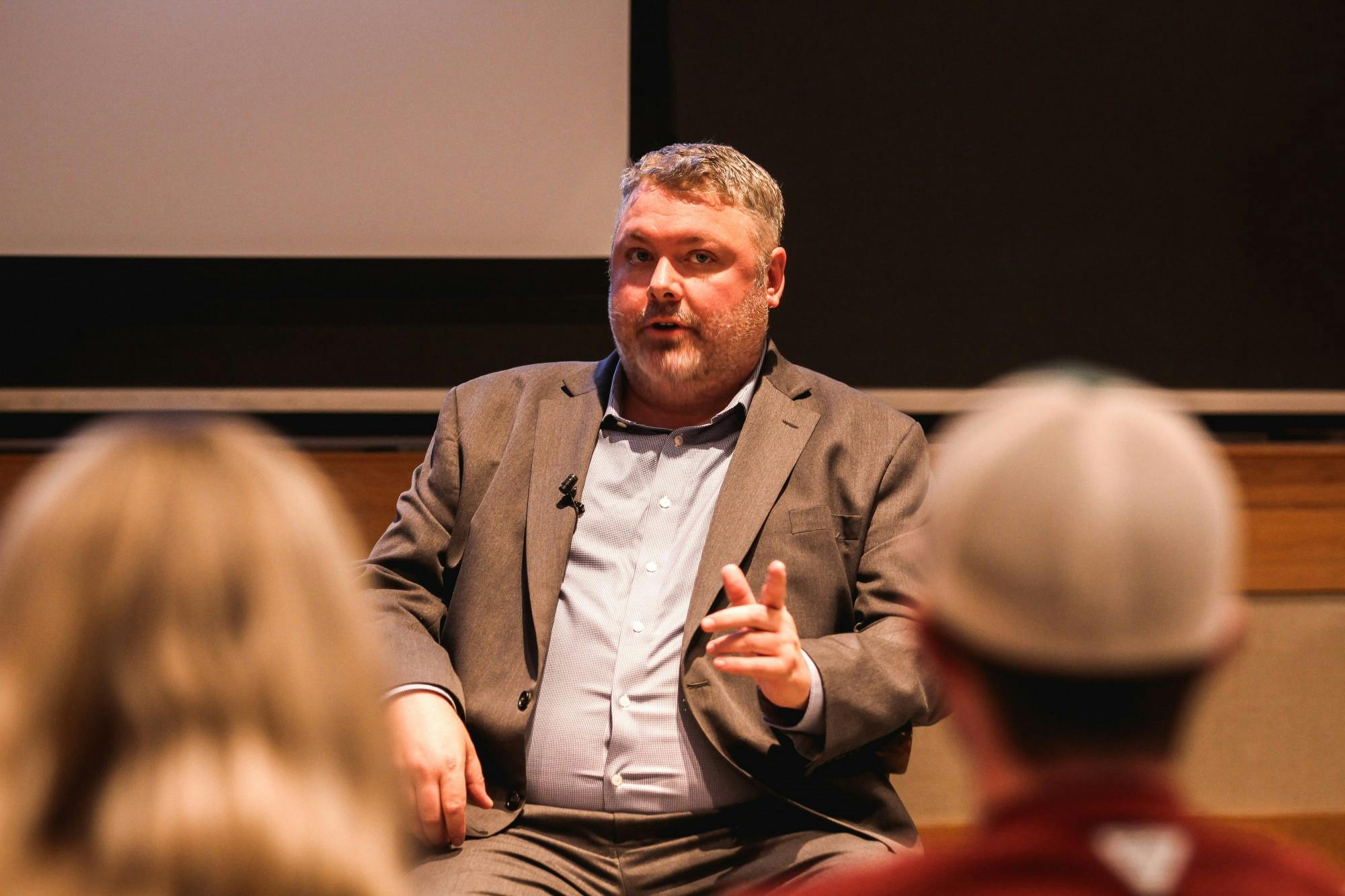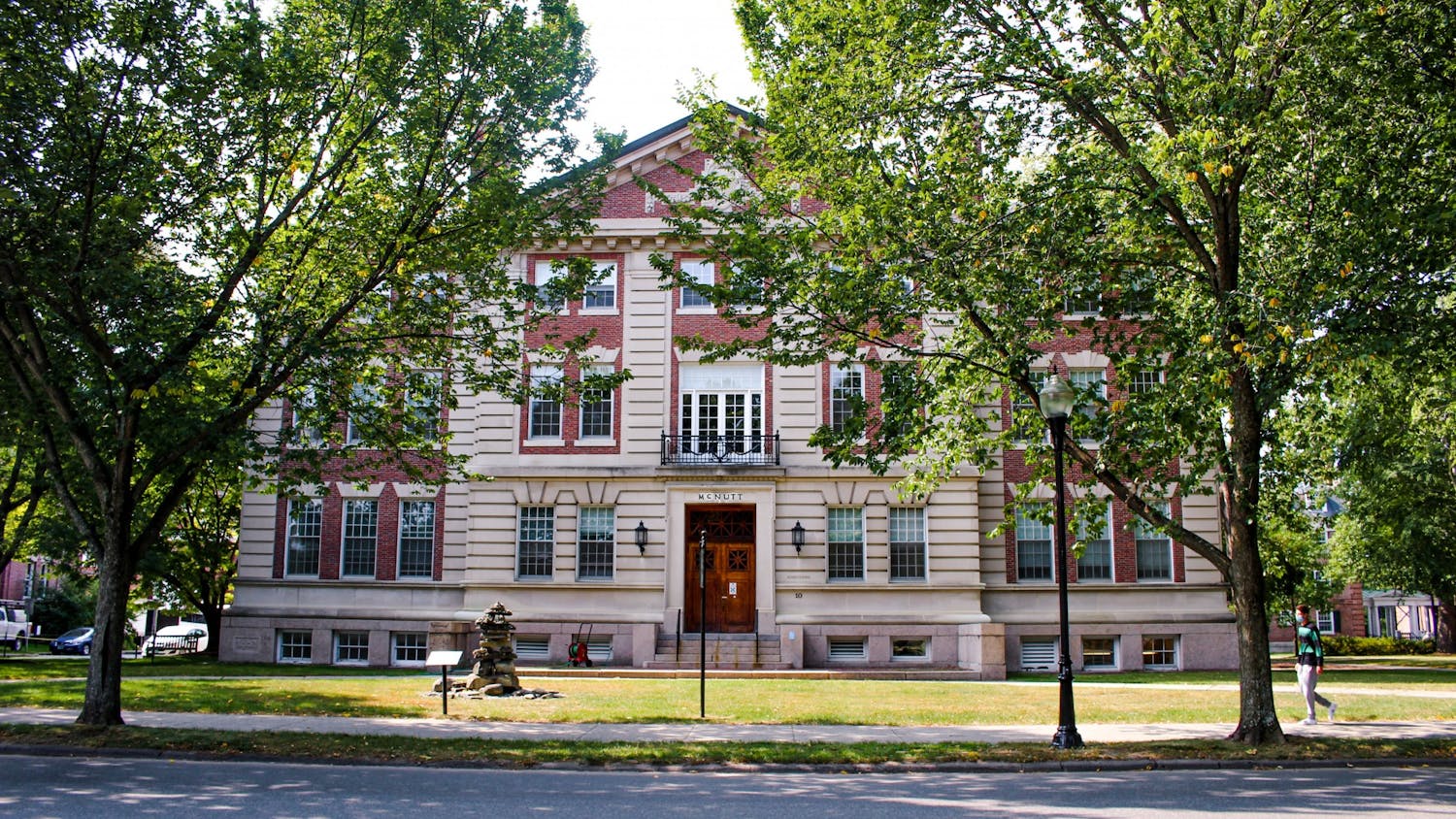On Monday, Oct. 17, Robert Burns, the Republican nominee for New Hampshire’s second congressional district, fielded student questions in a candidate forum hosted by the Dartmouth Political Union in Filene Auditorium. New Hampshire’s second congressional district covers the western portion of the state, including Hanover and the state capital, Concord.
The forum, which had around 30 attendees, began with several prepared questions from moderator Matthew Skrod ’24, the debate director of the DPU, and was followed by a question and answer session with the audience. Over the course of the event, Burns articulated his views on pressing issues such as inflation, abortion and climate change.
Burns is a small business owner who describes himself as “America First.” He defeated Keene, N.H. Mayor George Hansel — a more moderate candidate endorsed by New Hampshire governor Chris Sununu, a Republican — as well as five other Republican candidates in the September primaries. Several Trump administration officials, including former Secretary of Defense Christopher Miller, have endorsed Burns’s campaign. Some of his positions include a wall at the southern border to protect from “narco-terrorists” who kill “tens of thousands of Americans,” and sponsoring federal legislation to protect the concealed carry of firearms nationwide.
A number of students attended the event in order to better understand Burns. Lexie Gauthier ’26, who has not yet decided whether to switch her voter registration from Montana to New Hampshire, said she only likes to vote when she knows the representatives.
“It’s also just good to know what’s going on,” she said.
Gabriel Brigham ’26 said that he came to the event to better understand the candidate, also noting that he wanted to “challenge” Burns’s views.
The first question of the event concerned Burns's motivation for running. He cited his uneasiness with a lack of food and manufacturing security in the United States — a problem he attributed to an overdependence on foreign goods that mainly come from China. In particular, Burns pointed to semiconductors as an example of the dangers of foreign dependence.
“If China were to put an invasion over to Taiwan, they would control something about 85 to 90 percent of this chip manufacturing,” Burns said, noting the importance of bringing manufacturing back to the United States.
When asked about potential anti-inflation legislation, Burns voiced his support for investing in cleaner nuclear energy production in order to bring down the high energy costs which “cause everything else to go up in price.” He also advocated for increased investment in various forms of clean energy such as battery technology, despite questioning the idea that climate change is anthropogenic.
Ever since the Supreme Court overturned Roe v. Wade in Dobbs v. Jackson Women's Health Organization in June, abortion has become increasingly central to the upcoming midterm elections. Burns firmly held that he is “unapologetically pro-life.”
During an interview after the event, Burns broadly stated that the United States allows abortions at 40 weeks, or 10 months. In reality, only six states and Washington, D.C. have no restriction on abortion, with no other state allowing abortion past 25 weeks. An average pregnancy lasts 39 to 40 weeks.
Burns compared the United States’ alleged “40-week” allowance with Germany, France, Italy and Spain, none of which allow abortion after 15 weeks except in extenuating circumstances concerning the mother’s health.
“Don’t you think that’s kind of radical?” Burns said, in reference to this “disparity.”
Throughout the forum, Burns emphasized the importance of small government especially on issues of education, healthcare and government regulation. He quoted President Ronald Reagan, who memorably stated, “The top nine most terrifying words in the English language are: ‘I’m from the government, and I’m here to help.’”
Later in the Q&A, an audience member inquired about Burns’s stance on recent Florida legislation that bans LGBTQ+ education from kindergarten through third grade. Burns, who added that he opposes the existence of a federal Department of Education, said, “Florida wants to do what Florida wants to do.”
Burns’s primary win drew national attention, partially because it served as an example of a polarizing Democratic campaign strategy known as “boosting.” This election cycle has seen Democratic political action committees spend money on ads that positively highlight Republican primary candidates who are particularly close to former President Donald Trump. The goal of the strategy is to have an easier campaign against an extremist candidate in the general election. In Burns’s case, a Democratic PAC spent over $90,000 on advertisements calling him an “unapologetic conservative,” according to the New York Times.
Burns’s opponent, incumbent Rep. Ann Kuster ’78, declined the DPU’s invitation to participate in a town hall-style event. Instead, she will address the Dartmouth community on Oct. 20 as a guest of the Dartmouth Democrats.
“Well I think she wants something more controlled, she really only has one issue [abortion] that they’re running on right now,” Burns said, speaking on Kuster’s absence. “ … Obviously with inflation and [President Joe Biden] and the economic situation right now, there are questions that are very uncomfortable for her to answer.”
In response to Burns’ comment, Kuster campaign manager Jon Gonin provided a statement to The Dartmouth.
“The congresswoman has proposed a robust schedule of debates and forums with her opponent and looks forward to a civil discussion on the issues most important to New Hampshire,” Gonin wrote.
Prior to the event, Dalton Swenson ’26, who grew up in New Hampshire’s second congressional district, said he has decided to support Burns.
“I was an original supporter of George Hansel in the primary, but am going to vote for Bob Burns in the general election,” Swenson said.
The general election between Kuster and Burns will be held on Tuesday, Nov. 8. Dartmouth students are eligible to vote at Hanover’s only voting location, Hanover High School. Polls will open at 7 a.m. and close at 7 p.m.
Correction appended (Oct. 5, 10:50 a.m.): A previous version of this article incorrectly stated that an average pregnancy lasts 36 weeks. Pregnancy lasts 39 to 40 weeks, on average. The article has been updated.
Correction appended (Feb. 2, 1:05 p.m.): A version of this article also incorrectly suggested that Rep. Kuster declined to participate in a candidate forum hosted by the Dartmouth Political Union alongside her Republican opponent Robert Burns. The event which she declined would have been an individual, town-hall style forum hosted by the DPU. The article has been updated.




